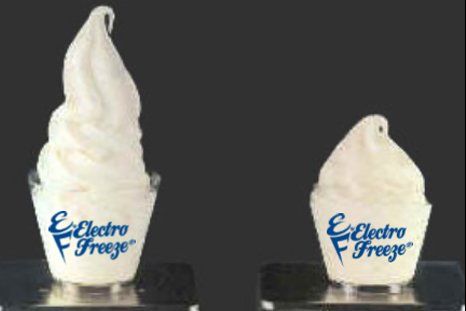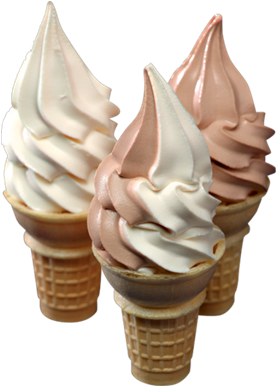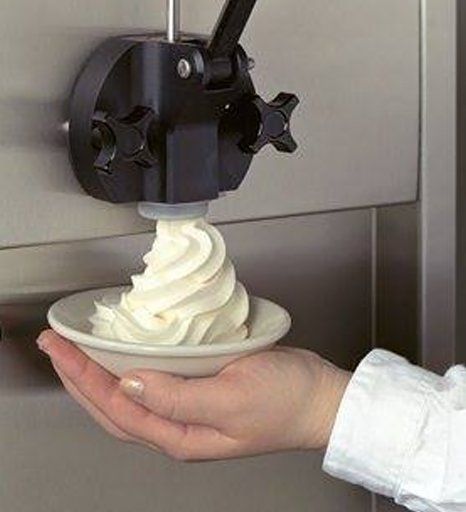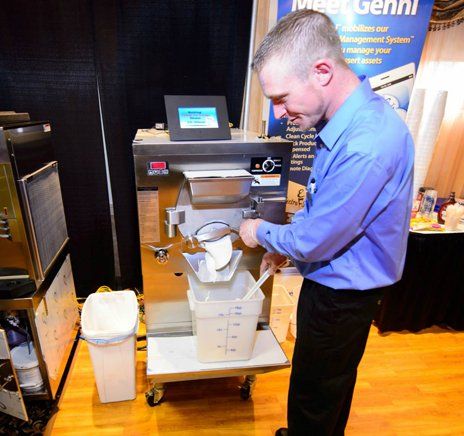Learn About Overrun
Sales & Service | Factory-Trained Technicians | Delivery and Installation Available
24-Hour ServiceFactory-Trained TechniciansDelivery and Installation Available
What Is Overrun?
Overrun is the term for the percent of the expansion of ice cream achieved from the amount of air incorporated into the product during the freezing process. An overrun of 50% means that it has expanded 50% (for example one gallon of mix will make one and a half gallons of the finished product). “Gravity”-fed units typically yield on average about 35% overrun. “Pressurized” units can yield 65% overrun or greater. For best quality and appearance of soft serve, a 50-60% overrun is the most desirable. How well the machine is operating as well as if it is “gravity” or “pressurized” affects the overrun that is ultimately attainable.

65% vs. 35% overrun (both at 5¼ oz.)

Why It Matters
Overrun shows in both the appearance and taste of the ice cream and your profitability. Soft serve with the optimal overrun is dry in appearance and stands up well without drooping. Many people may say that a product is “too warm” when in fact it is cold enough but lacks the proper amount of air which gives it structure and body. Think of the example of whipping cream. Without air, it looks like milk. After air or “overrun" is whipped in, it gains body and can be turned upside-down. The product that is overbeaten loses the ability to hold air. Some machines try to compensate for the lack of overrun by driving down the temperature of the product. Although it helps to “stiffen it up” the product, it becomes icy and loses its creaminess and taste. Overrun also affects profits by the perceived amount of product that is being served. Without enough overrun, you’re forced to make a choice. To maintain your product costs, you either serve a “small” cone and make a disgruntled customer or give away more product. Higher overrun makes creamy ice cream and a “big” cone.
Pumps in Pressurized Machines
Pressurized machines use pumps to transfer the mix to the freezing cylinder and pressurize it. Some machines use piston pumps with “O” rings and check mechanisms. Some use peristaltic tubes that require no lubrication and have many fewer parts. This makes for easier cleaning. The amount of pressurization ranges from 18 pounds to 30 pounds depending on the brand of the machine and the design of the pump. The higher the pressure, the better the air incorporation. (Hint: Electro Freeze® pressurized machines use 30-pound pressure switches.)
How the pumps are controlled (turned on and off) is very important. The best systems use pressure switches that maintain the correct pressure, air, and mix. Some machines use less desirable “timed pumps” that turn on during product draw and remain on for a “timed” amount after the end of the draw. They cannot compensate for varying draw speeds or volumes so careful timing of the draw rate is required. To assure the barrel is pressurized enough, the pump is timed so that it pumps more than enough and then “blows off” excess pressure back into the mixing reservoir after every draw. This shows as bubbles in the hopper and low/inconsistent overrun. Electro Freeze® machines from Specialized Equipment LLC do not use “timed pumps.”


Calculating Overrun
Overrun can be calculated by weighing a container (pints are most often used) and making a note of it so it can be subtracted later. Note how much the container weighs filled with your liquid mix and subtract the container weight. Once noted, both numbers can be used again whenever you want to check your overrun. Fill the same container level with the frozen product and note its weight. Now just plug it into the formula.
(Wt. of the mix – Wt. of the same vol. of ice cream)/Wt. of the same vol. of ice cream x 100% = %Overrun
Example: Container = 1 oz., container with mix = 19 oz. Subtract the container weight for a mix Wt of 18 oz. Container with leveled-off ice cream 13 oz (-1 oz of container wt )= 12 oz. ice cream. (18-12)/12 x 100%. = 50% overrun.

Share On: